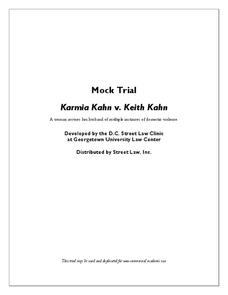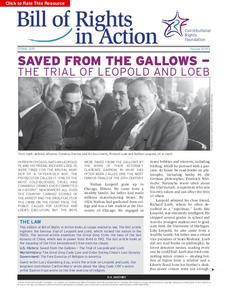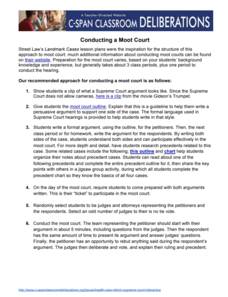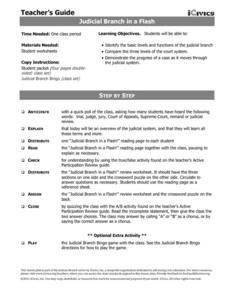Curated OER
Science in the Court Room
Share their opinions on the use of DNA databases in criminal investigations. After reading an article, they evaluate the pros and cons of the databases and work in groups to answer discussion questions. They write a letter to a state...
News Literacy Project
News Goggles: Covering a Newsworthy Trial
The trial of Derek Chauvin, former Minneapolis police officer charged in the death of George Floyd, is the focus of a lesson that asks pupils to compare how local, nationial, and international news organizations reported the testimony of...
Curated OER
Lesson 5: In the Courtroom: Understanding the Players and the Action
Young lawyers put Goldilocks on trial as they develop an understanding of the legal system in the final lesson of this five-part series. After learning about key terms relating to litigation, learners are assigned roles and reading...
Street Law
Mock Trial - Kahn v. Kahn
A woman accuses her husband of multiple instances of domestic violence in the mock trial case, Karmia Kahn v. Keith Kahn
Constitutional Rights Foundation
Saved from the Gallows — the Trial of Leopold and Loeb
Was justice served for Bobby Franks? An informative article about the 1924 trial of Richard Loeb and Nathan Leopold includes an overview of the murder of Bobby Franks, the defense’s legal strategy, and excerpts of closing arguments from...
Street Law
Mock Trial - Brooks v. Lawrence and the Metro City Police Department
An incident with a Swiss Army knife leads to a suit against the police department for battery, false arrest, and intentional infliction of emotional distress in the Brooks v. Lawrence & the Metro City Police Department mock trial...
Curated OER
What is a Court?
Young scholars examine and discuss the judicial branch of the U.S. government. They define what a court is, list three characteristics of a trial court and an appellate court, and analyze various trial and appeal situations.
School Improvement in Maryland
Court Proceedings Civil Cases
What's the difference between civil and criminal law? How do the court proceedings differ in these two types of trials? How do the standards of proof differ? Why do these differences exist? As part of their examination of the US court...
C-SPAN
Conducting a Moot Court
Review the conduct of different roles within the Supreme Court. A moot court activity educates learners about the roles of each member of the court and the process of a case with video clips, research activities, a graphic organizer,...
Center for History Education
Cold War Case Files: The Rosenberg Trial - Was Justice Fairly Served?
The Rosenbergs—executed for their role in a Soviet-era spy ring—continue the captivate the American imagination. Using a history lab format, young historians examine the trove of documents associated with the case, including photographs...
Administrative Office of the US Courts
Elonis v. U.S.
With the explosion of social media sites, with online threats and cyber bullying, issues of freedom of speech have taken on a whole new aspect. Elonis v. U.S. represents the first time the Supreme Court has considered whether or not...
YMCA
Turning Courtrooms into Classrooms
Turn the class into the next episode of Law & Order! Scholars work together to create a mock trial over the course of several weeks before going before a judge for the case performance. They take on different roles, go through...
Curated OER
Mock Trial
Students rewrite a traditional fairy tale to represent the viewpoint of the villain. They participate in a mock trial of that villain in which all regular court participants (judge, jury, defendant, witnesses, plaintiff, etc) play roles.
Curated OER
Beowulf Mini-Mock Trial Manual
In this Beowulf worksheet, students identify a crime and prepare the prosecuting and defense case to present to the class "jury." Students must follow court procedure and use court terminology as they present their case.
Curated OER
Why a Mock Trial?
Students participate in a mock trial. They discover how U.S. courts resolve conflicts.
Curated OER
Lesson 2-Profiles in Courage: To Kill A Mockingbird and the Scottsboro Boys Trial
Review one of the most memorable cases in the history of the United States. After reading To Kill A Mockingbird, young scholars read and select court transcripts and other primary source material from the Scottsboro Boys Trial of 1933....
Heritage Foundation
Procedural Rights: Amendments VI, VII, and VIII
Even in court, your class members have procedural rights provided by the amendments. Teach high schoolers this important lesson by using the 18th installment of a 20-part unit exploring the US Constitution. The resource provides several...
Curated OER
Thomas Edison on Trial
Students learn about Thomas Edison and his invention laboratory/factory and the concept that he might not have given enough credit to the employees who invented for him. They hold a trial to determine guilt or innocence as a outcome.
Curated OER
Twelve Angry Men: Trial by Jury as a Right and as a Political Institution
Students explore the constitutional guarantee of the right to trial by jury. For this U. S. Constitution lesson, students read or view Twelve Angry Men and respond to discussion questions regarding the jury. Students examine the...
Constitutional Rights Foundation
Plyler v. Doe: Can States Deny Public Benefits to Illegal Immigrants?
Illegal immigration is an ever-changing source of consistent controversy. A reading passage about the rights of undocumented workers and illegal immigrants—and the lack thereof—guides high schoolers into a mock trial activity. Three...
Judicial Learning Center
Why Study Landmark Cases?
Why study landmark Supreme court cases? A helpful lesson offers a brief but valuable argument for the importance of these cases in the field of criminology. It introduces scholars to some key terms necessary for studying court cases and...
iCivics
Judicial Branch in a Flash
What is the difference between the federal court and state court systems? What about criminal versus civil cases? Check out this resource that will offer your class members a general and effective overview of the judicial branch in the...
Curated OER
Courts in the Classroom: Ritter v Stanton
Students read the case briefs of Ritter v Stanton. They simulate the trial with classmates taking various parts such as appellant, appellee, bailiff, and justices. After conducting a mock argument, they write their own opinion for the case.
Curated OER
Indiana Courts: How Do They Work?
Young scholars identify the branches of Indiana's judicial system and determine the differences between the different courts and different types of cases. Students create a flow chart showing how a court case works its way through the...

























